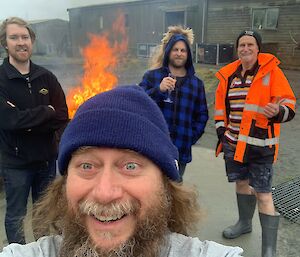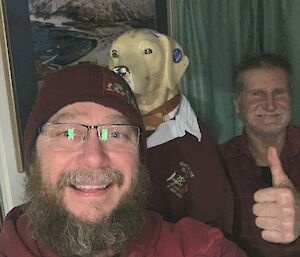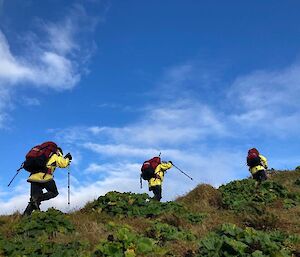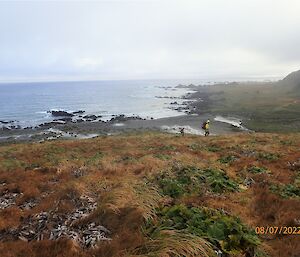Forget the Wandering Albatross and the Azorella macquariensis and spare a thought for the Wandering Macca Sparkie, a newly discovered sub species of Homosapien, endemic to Macquarie Island and conspicuously identifiable by a most likely mood related head plumage, be it iridescent “safety" yellow, “proud & victorious” maroon or occasionally subtle and “relaxed” royal blue.
This extremely rare bi-pedal creature can be found mainly in its captive environment around station and on the isthmus between the electrical workshop and the new Razorback Hill magnetic quiet zone but it is occasionally found “in the wild” ambling across the plateau between huts and sometimes even out at sea.
Whilst it is relatively difficult to conclusively identify in its usual environment and amongst the other vertical oriented occupants of the island, it is readily identified in the wild where it is usually only accompanied by one to three other bi-pedal specimens (usually the others are the more common Meandering Black Top Tradie). Whilst in this environment it can also be singled out by its calls of unique tone a frequency that, when studied closely, sound strangely like words of despair. Some say they have deciphered these sounds and discovered human like phrases in the Sparkie’s sparse vocabulary such as “are we at the top yet”, “I think it’s time to stop and enjoy the scenery” and “not another up”.
The Sparkie is equally difficult to identify when on the water with respect to the other bi-peds that always accompany in the Sparky to the water’s edge in larger manic groups, then proceeding in smaller organised groups carefully and cautiously into the sea.
The talented and diligent TASPAWS Rangers at Macquarie Island are always looking for opportunities to study the rare and intrepid creature that is the "Wandering Macca Sparkie" but it can be difficult to find as it is cautious around the Common Black Tops as they have been known to randomly attack, and, being some-what less than splendiferous in appearance, it blends in extremely well to its environment. So, if you are lucky enough to see one (or unlucky enough to hear one in the wild) be a good human, help the Rangers in their quest for glory and global recognition, and write it up on the station whiteboard.







